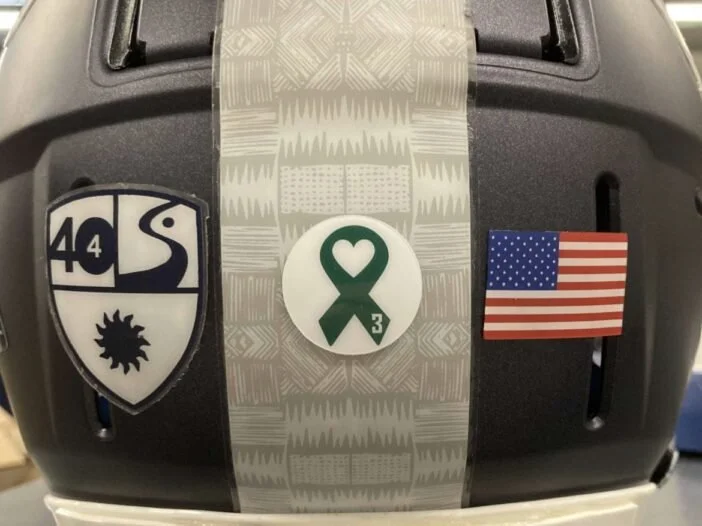GU participates in College Football Mental Health Week to eliminate stigma when discussing mental health
The Hoya
The iPhone alarm blares at 5:30 a.m., summoning a Georgetown University student-athlete to a 6 a.m. weight lift, followed by an 8 a.m. class, an hour of body treatment, film review, a second class and team practice — all before late afternoon.
Day in and day out, this rigorous routine takes a physical and mental toll on Hoya athletes. In response, during the week of Oct. 2, Georgetown became one of 123 universities participating in College Football Mental Health Week, which seeks to eliminate the stigma around mental health discussions, organized by Hilinski’s Hope Foundation (H3H). H3H organized the week around Mental Illness Awareness Week from Oct. 2 to 8, which culminates Oct. 10 with World Mental Health Day.
This week, H3H brings more hope to the Hilltop.
Rob Sgarlata, Georgetown football’s head coach, said the goal of the initiative is to bring attention to mental health for the whole university.
“For us, it’s trying to raise awareness through the game and around campus, not just within athletics but overall,” Sgarlata told The Hoya.
In 2018, Kym and Mark Hilinski founded the Hilinski’s Hope Foundation in honor of their son Tyler, a former Washington State University quarterback who died by suicide earlier that year. The organization aims to “educate, advocate, and eliminate the stigma associated with mental illness,” according to the H3H website.
Kym Hilinski said since Tyler’s death, the foundation has visited countless college campuses to advocate for mental health awareness.
“We have spoken on dozens of campuses to help encourage these conversations and share Tyler’s story,” Hilinski said in a press release. “We miss Tyler every day, but we are grateful to know that what we are doing is making a difference and that he would be proud of us.”
In 2021, the Hilinskis visited Georgetown’s campus to organize weeklong activities with the players and Dr. Erica Force, head of Georgetown’s Athletic Counseling Services and a licensed clinical and sport psychologist.
This year, Georgetown coaches and players will wear the Hilinski’s Hope logo, a green ribbon with Tyler’s number 3, on their helmets and whistles. The athletic department has also worn green all week in support, but Sgarlata has a different favorite relic.
Sgarlata said the Hilinski’s Hope wristband is the item that carries the most weight for him.
“I have a Hilinski’s Hope wristband on my wrist, and the big thing about that that nobody really realizes is the suicide prevention hotline is on the other side of the bracelet that they give out,” Sgarlata said. “I know there is a number of stories where that has come in extremely handy for people in critical cases.”
In pursuing this initiative, Kym and Mark Hilinski hope to save lives by promoting a broader discussion about mental health across all sports and offering better mental wellness programs for student-athletes, particularly for college football players like Tyler.
While the NCAA constitution commands schools to promote an atmosphere that supports mental health by guaranteeing access to adequate resources and open dialogue, student-athletes have continued to express concerns.
In a survey conducted by the NCAA in 2021, only 48% of female and 46% of male student-athletes felt comfortable reaching out for mental health support on campus. In the same survey, when asked whether they thought their athletic departments prioritized student-athlete mental health, 55% of male and 47% of female student-athletes agreed or strongly agreed.
Kym Hilinksi said difficult discussions on mental health are vital.
“While conversations around mental illness can be tough and at times uncomfortable, it is absolutely critical for the well-being of our student-athletes,” Kym Hilinski said.
The Hilinski family knows this is easier said than done. Their younger son, Ryan, is a quarterback for Northwestern University and has first-hand experience with the battle to talk about mental issues in the world of college football.
Ryan Hilinski spoke to the value of sharing one’s mental health state with others.
“Talking about your mental health takes guts,” Hilinski said in a press release. “It shows strength to be vulnerable, but that is what is needed to be real with your teammates, coaches and family. I’m proud of my family for creating College Football Mental Health Week to help all student-athletes to know that they are not alone.”
Sgarlata said the week is significant for players and coaches alike.
“It’s a tool that they provide through an impactful, personal story,” said Coach Sgarlata, “And I think that is what has made an impact on my staff, myself and our players.”

